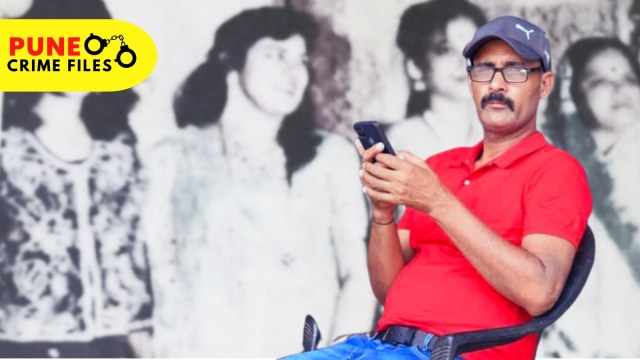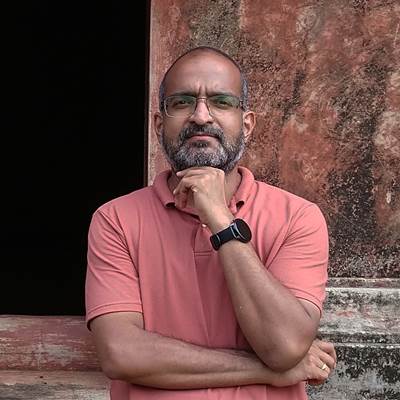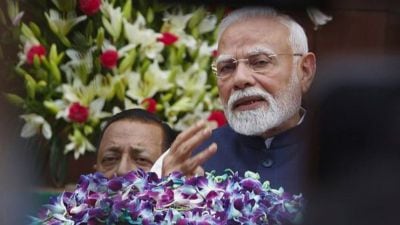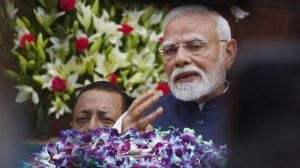Click here to join Express Pune WhatsApp channel and get a curated list of our stories
Pune Crime Files: How death row convict in Rathi family murders case, let free after 28 years, landed in prison again
Narayan Chetanram Chaudhary was set free after the Supreme Court ruled that he was a juvenile at the time of the murders in 1994.
 A fresh FIR was lodged against Niranaram alias Narayan Chetanram Chaudhary at the Wakad police station under sections of the Narcotic Drugs and Psychotropic Substances (NDPS) Act. (Express)
A fresh FIR was lodged against Niranaram alias Narayan Chetanram Chaudhary at the Wakad police station under sections of the Narcotic Drugs and Psychotropic Substances (NDPS) Act. (Express) Niranaram alias Narayan Chetanram Chaudhary, an accused who was awarded death punishment for the brutal and chilling murders of six members of the Pune-based Rathi family and their maid in 1994, was set free in March this year, as the Supreme Court ruled that he was a juvenile — a 12-year-old boy — at the time of the incident.
Chaudhary moved out of jail after spending 28 years split between the Yerwada and Nagpur central prisons. But Chaudhary landed back in the Yerawada central prison in September this year due to his alleged involvement in a case of smuggling opium from Rajasthan to Pune.
On August 26, 1994, three people armed with knives entered businessman Sanjay Rathi’s family’s house at Himanshu Apartment, Shilavihar Colony, in the Kothrud area of Pune.
 Narayan Chetanram Chaudhary was arrested in a drug smuggling case in September this year. (Express)
Narayan Chetanram Chaudhary was arrested in a drug smuggling case in September this year. (Express)
They killed six members of his family, including his mother Meerabai, 45; his pregnant wife Babita alias Nita, 24; his two sisters Preeti, 19; and Hemlata, 27, his son Chirag, 3; and his nephew Pratik, who was just one-and-a-half years old, and their maid Satyabhama Sutar, 42.
The probe revealed that the deceased women and even children were killed by the accused, one by one, by “inflicting numerous knife blows”.
The FIR in this case was lodged at the Kothrud police station. During the investigation, the police arrested three assailants, including Chaudhary, Raju Rajpurohit and Jitendra alias Jitu Gehlot, from different spots in Rajasthan.
According to the police probe and the FIR lodged at Kothrud police station in Pune, Rajpurohit, who worked at the Rathi family’s Sagar Sweet Mart for about three months, quit a few days before the murders.
He allegedly conspired with Chaudhary and Gehlot — his colleagues at another sweet shop from where he was allegedly sacked earlier that year — and decided to rob the Rathi family to earn a quick buck.
On August 26, while Rajpurohit, known to the Rathis, gained entry into the house, Chaudhary and Gehlot allegedly barged in. The trio killed the family members and allegedly made away with cash, gold and other valuables. The probe said the accused fled to Rajasthan after committing the crime.
The breakthrough came with Chaudhary’s arrest on September 5, 1994, from Rajasthan. The other two were arrested in October 1994.
While Rajpurohit turned approver, Chaudhary and co-accused Gehlot were held guilty by a sessions court in Pune in 1998 and sentenced to death. The Bombay High Court upheld the death sentences in 1999 and the Supreme Court in 2000. Since there were no eyewitnesses to the crime, the court relied on the testimony of Rajpurohit, who turned approver.
According to retired ACP Vinod Satav, who was part of the team investigating the Rathi family murders, the accused (Chaudhary) never claimed to be a minor during the trial and sentencing. But Chaudhary filed the criminal miscellaneous petition (CMP) on October 29, 2018, before the Supreme Court seeking a review in its order confirming his death sentence, claiming that he was a juvenile at the time of the crime.
“When the Supreme Court referred the matter to the Principal District Judge for conduct of an inquiry into the matter, I represented the accused in that proceeding. We presented the evidence before the court which included the school leaving certificate from his native village and the sworn affidavits of the village elderly and mukhia. After the conclusion of this inquiry, a report was sent to the Supreme Court,” said Pune-based senior lawyer Harshad Nimbalkar.
When asked about the possible reasons why he could not have been identified as a minor at the time of the arrest, Nimbalkar said, “He was of a strong build at the time and was not aware of his rights. Moreover, the bone ossification test performed to ascertain the age was not performed by the Pune police at the time.”
As the Supreme Court ordered in his favour, Chaudhary walked out of prison on March 27, 2023. But the Pimpri-Chinchwad police arrested Chaudhary on September 2 from Wakad near the Pune-Mumbai highway with seizure of 898 gm opium worth Rs 3.7 lakh from a bag in his possession.
A probe revealed that the accused held with contraband was the same person who was arrested in the sensational Rathi family murders case in Pune but released as per the Supreme Court’s order.
A fresh FIR was lodged against Chaudhary at the Wakad police station under sections of the Narcotic Drugs and Psychotropic Substances (NDPS) Act. In the case records, the police mentioned Chaudhary’s age as 41 years and that he is a resident of Jalabsar village in Bikaner district, Rajasthan.
Investigation officer of the case, Assistant Inspector Santosh Patil, said, “Our probe suggests that after his release following Supreme Court order, he had returned to his native village. He came in contact with a suspect identified as Sugnaram, at whose behest Chaudhary smuggled the contraband to Pune. For this job, Chaudhary was promised Rs 25,000. Our probe suggests that after his release, Chaudhary had no job and no source of income. His family, too, has distanced themselves from him. He filed a bail plea recently but the court rejected it.”
“He is currently lodged in the Yerawada central prison for the judicial custody remand in the opium smuggling case,” said Senior Inspector Ganesh Jawadwad, in-charge of the Wakad police station.
Click here to join Express Pune WhatsApp channel and get a curated list of our stories














